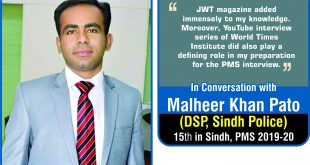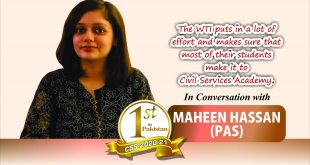Dr Syed Mehmood Hasan, the Director Office of Research Innovation & Commercialization (ORIC) at NED University of Engineering & Technology, Karachi, is a man of many talents. With his meritorious corporate sector services in Pakistan as well as in the United Kingdom, during the last 15 years, he has earned huge plaudits from all sectors of society. Besides an illustrious career in strategic management on to his credit, Dr Hasan is also the brain behind the establishment of the ORIC and some other projects including, but certainly not limited to, NED Entrepreneurship Society (NES), Maker Studio (Multi-Disciplinary Lab), Centre of Innovation Entrepreneurship Technology Incubation & Commercialization (CINETIC), the Society of Manufacturing Engineer (SME–Student Chapter) and American Society of Mechanical Engineer (ASME–Student Chapter).
Dr Hasan has also introduced and developed the programmes of Masters in Engineering Management – Supply Chain Management and Bachelors in Management Science. The policy framework to build an entrepreneurial eco system at NED University is also his brainchild.
ORIC Mission
At NEDUET, research is the top priority as it has a vital role in sustainable economic growth and development of knowledge-based economy in the country. NEDUET always endeavours to motivate and facilitate its pool of researchers to enhance their efforts. The Office of Research, Innovation and Commercialization (ORIC) has been established with a mission to streamline and enhance research activities at the university. The ORIC is aimed at providing strategic vision and operational support to the University’s research activities. ORIC plays an active role in facilitating research and encouraging the faculty to contribute and share in promoting goal-oriented research activities. ORIC also aims to act as a catalyst for the transformation of knowledge toward invention and innovation and its subsequent commercialization, leading to a positive impact on the welfare and well-being of our nation.
Jahangir’s World Times (JWT): What is the purpose of ORIC and how does it help students in embarking on an illustrious career in future?
Dr Syed Mehmood Hasan (DSMH): ORIC is there to support research activities that are somehow related to innovation and then ORIC’s job is to commercialize that research too.
We operate ORIC at three levels i.e. strategic, tactical and operational. On strategic level, we have developed policies for Intellectual Property and Research Collaboration. On tactical level, we have asked HEC to fund us for Incubation Centre and they have given us some seed funding, and then we have established our Business Incubation Centre named CINETIC (Centre of Innovation, Entrepreneurship, Technology Incubation & Commercialization). Furthermore, at operational level, we have established NED Entrepreneurship Society (NES) at a student level. So, all these levels are supporting our students and preparing them for an illustrious and a thriving future.
JWT: What are the problems of Pakistan’s industrial sector and how does your institute support it?
DSMH: Succinctly, it’s “TRUST DEFICIT”. For that, what we have done is the building of industry’s trust in the fact that our institute and its students are fully able to handle any type of problem. We did some mini-projects for the industry and then on the basis of the results thereupon, we have received some bigger projects and we are also working on commercializing those projects/products.
JWT: What projects are being developed by the ORIC students?
DSMH: In multiple domains, in fact. Our work covers almost all engineering sectors.
JWT: As a vast majority of Pakistani students are in serious want of proper career counselling, do you have any plans in this regard?
DSMH: We have worked with some NGOs in Pakistan to address the issue. We have conducted a number of seminars and workshops so that our students may know where to head later in life.
JWT: What is the Maker Studio and what services does it offer?
DSMH: The Maker Studio is a platform that will be offering tools to assist in completing a wide range of creative projects. It is a one-stop facility where students and faculty can efficiently develop their ideas into functional prototypes, under expert guidance and with availability of all the necessary materials, tools, equipment and machinery, which would otherwise be impossible or too difficult for them to get access to in the current academic setting.
The tools typically consist of the 3D printing facility, Laser Cutter, Cutting, Sawing, Drilling, CNC machine, Milling Machine, Print Graphics Cutting, etc.
JWT: How activities of Maker Studio and other departments of ORIC are funded?
DSMH: Under the umbrella of ORIC come three domains: that are CINETIC, the Business Incubation Centre, NED Entrepreneurship Society – a student wing of ORIC and Maker Studio. All of these three are self-sustainable insofar as their revenue-generation is concerned. CINETIC has, however, secured funding from HEC for its operations and ORIC has also secured funding from multiple sources for the development of Maker Studios. In addition, ORIC offers, throughout the year, different sets of training and workshops both inside and outside the NED.
JWT: Given the recent trends in job market, do you think that Pakistan needs to excel in engineering and technology and what steps would you suggest in this regard?
DSMH: As our economy is not in a good condition, mainly due to lack of research and development (R&D) in the business sector, so we need to encourage our students to work hard in engineering and excel in technology development.
JWT: Pakistan and the Muslim world at large lag far behind the developed countries in the field of innovation and technology. What steps should we take to come, at least, at par with them?
DSMH: We need to encourage our students to solve the problems of the society. It will not only impact the lives of the masses but will also help our society in achieving better results. In this way, we will be able to solve our own problems and also those of the Muslim countries.
JWT: Anything that distinguishes your institution from other engineering universities and what future do you foresee for the ORIC?
DSMH: We work more toward innovation in engineering and encourage our students to go beyond studies and create job opportunities through entrepreneurship and startups.
 Jahangir's World Times First Comprehensive Magazine for students/teachers of competitive exams and general readers as well.
Jahangir's World Times First Comprehensive Magazine for students/teachers of competitive exams and general readers as well.



